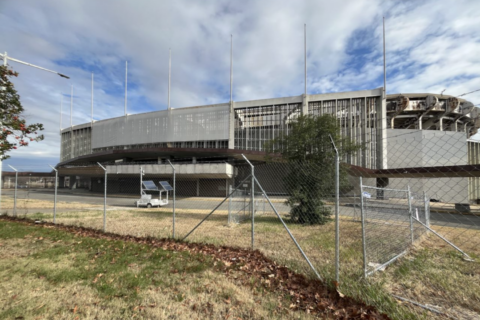Mayor Muriel Bowser unveiled Tuesday her 2026 D.C. budget proposal, along with a supplemental 2025 budget proposal, which avoids tax increases and government layoffs but eliminates or alters some programs involving social services.
The proposals address a funding gap created by Congress and look to invest in the city’s future, including in education and public safety.
Bowser, alongside city officials, presented the budget at the Martin Luther King Jr. Memorial Library on Tuesday.
“We have really blunted what could have been a catastrophic situation for city services this summer in fiscal 2025 and we have been very focused on a FY 26 budget that both right sizes our spending and invest in our growth,” Bowser said.
Both needed to be turned over together, which Bowser said delayed getting the proposals to the D.C. Council.
In the FY26 budget, more than half of the local funds will go toward public education and services such as transportation. It invests in public safety, with $30 million to hire more D.C. police officers and to buy technology.
More than $80 million would be invested in the fire department to add ambulances, firetrucks and gear as well as to continue the blood infusion program.
The supplemental budget will include dramatic cuts that need council approval — but Bowser said it avoids furloughing employees and temporarily closing some government facilities. It also avoids shrinking upcoming summer programming in the District.
Filling a $347 million gap
The cuts are needed after Congress cut the District off from $347 million in local tax revenue.
To address the FY25 gap, the District is taking a couple of courses of action. Under the proposal, it would continue on with a hiring freeze to save a projected $63 million.
“We will be allowing for more waivers from the hiring freeze and the contracting freeze, but it will stay in effect because we want to be very cautious about our spending given the uncertainty of the broader fiscal environment,” said Kevin Donahue, the city administrator.
The city would also make $175 million in non-personnel related reductions.
It plans to push $202 million of spending and costs to future budgets, FY26 or FY27. The proposal would shift $160 million of local funds to special purpose funds.
Lastly, Bowser’s plan said it would address the gap by capturing $117 million of excess special purpose funds and dedicated tax revenues.
What cuts are involved in FY26?
Among the programs that would be rolled back under the FY26 budget are several aimed at helping families in need. During Tuesday’s news conference, city officials said some of the programs were targeted because their costs were outpacing revenue.
That’s the case for the Temporary Assistance for Needy Families program, which provides cash and assistance to applicants. The proposal would save $2 million on an annual basis, according to the city, by pausing cost of living increases for benefits and reducing benefits for families that don’t meet its requirements.
Under the budgets proposed, changes would be made to Medicaid eligibility, benefits and provider rates. It would shift some childless adults and adult caregivers to a new health plan run by D.C. Health that the city said would offer many of the same benefits.
The proposals would also cut two programs that haven’t gone into effect yet – the child wealth funds and the child tax credit.
There would also be some changes for city employees’ benefits under FY26. According to the city, overtime costs have risen by $29 million, in part because of the use of leave.
FY26 would also restrict D.C.’s paid family leave program, limiting such leave to two weeks and defining which family members would qualify. It would require employees who take family leave to commit to coming back to work for 12 weeks following their absence.
Counteracting federal job losses, boosting economy
The District is looking to counteract impacts of the Trump administration’s changes to the federal workforce, which D.C. estimated will end in a loss of 1 billion in tax revenue over the next four years and 40,000 government-related jobs.
The budget also aims to attract jobs and new businesses to D.C. by cutting red tape around opening a business, such as requirements around zoning and clean energy directives.
Part of that venture also involves repealing Initiative 82, controversial legislation that ended the tipped minimum wage and created one wage scale for workers regardless of their industry.
Bowser has called for the legislation to be repealed, arguing it harms the restaurant industry. Her budget would also create sales tax holidays for restaurants.
Meanwhile, a big item in the 2026 budget is anticipated to be the first installment of nearly $90 million toward the redevelopment of the old RFK site. That’s part of the proposed deal to bring the Commanders back to the District.
One council member told WTOP they hope to vote on the budget by the beginning of August.
Details of the budget are available on the D.C. government website.
You can watch video of Bowser’s presentation from WTOP’s partners at 7News below:









